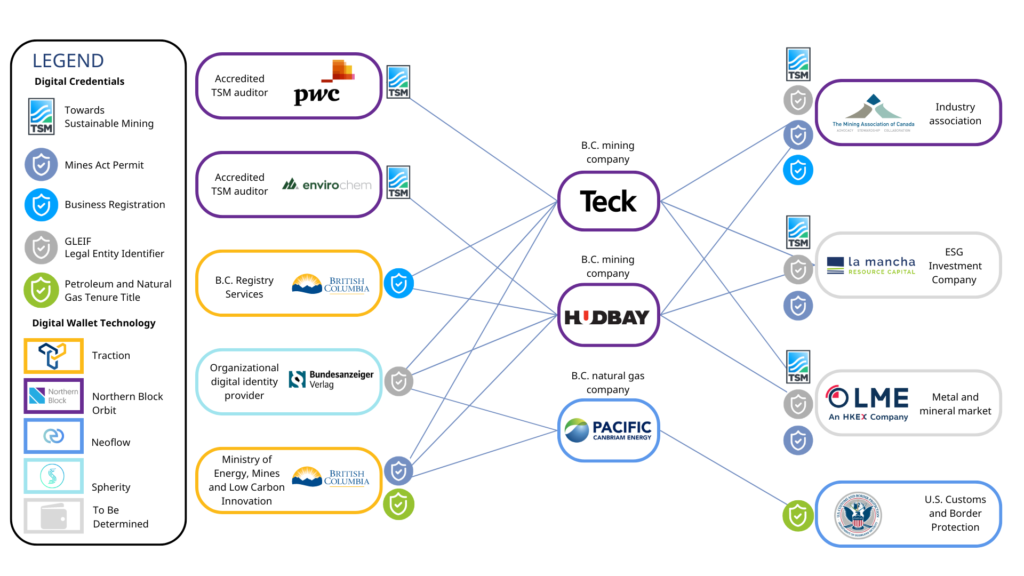Energy & Mines Digital Trust
|
Energy & Mines Digital Trust (EMDT) is empowering natural resource operators with digital tools that support B.C.’s sustainable economic development while maintaining high levels of environmental protection.
Stricter sustainability regulations are emerging globally, and governments are imposing tariffs and other trade barriers on unsustainable products. B.C. is internationally recognized for strong environmental, social and governance standards, but without a reliable way to share sustainability data worldwide, B.C. companies struggle to demonstrate where and how their products are made.
With digital credentials, mining and energy operators can share trustworthy, verified data, enabling them to compete in sustainability-focused markets.
Driving progress for natural resource operators in B.C.

EMDT is empowering natural resource companies to share authoritative data worldwide using digital credentials.
Available now
Mines Act Permit
Issued by the Ministry of Energy, Mines and Low Carbon Innovation, major mines can prove they are permitted to operate in B.C. and demonstrate that they are located in a province with strong sustainability regulation.
Towards Sustainable Mining
Through collaboration with the Mining Association of Canada (MAC), mining operators can use digital credentials to satisfy their membership responsibility to MAC and share verified ESG data worldwide, positioning mines to increase their competitiveness in global markets.
Estimated availability in 2025
Petroleum and Natural Gas Tenure Title
Private developers can quickly and reliably prove they have the rights to develop resources in B.C., making for smoother, more efficient business interactions. Developers can also use their digital credential to show where their resources came from.
United Nations Transparency Protocol
To realize the full potential of digital credentials, a wide range of organizations must adopt this technology on a global scale.
Recognizing this, the Government of B.C. is leading a project in collaboration with the United Nations to establish the United Nations Transparency Protocol (UNTP).
The UNTP is a framework designed to support government and private organizations in sharing supply chain data using technology such as digital credentials.
The UNTP aims to make international data exchange:
- Trusted
- Accessible
- Standardized
This simple protocol, supported by existing business structures, will help companies contribute to more sustainable global supply chains.
United Nations Critical Raw Materials project
The UN Critical Raw Materials Traceability and Sustainability project (CRM project) puts the UNTP into action.
The purpose of this project is to reduce false ESG claims and make supply chains more sustainable and resilient.
- Sustainable supply chains are designed to minimize environmental impacts and maximize human welfare.
- Resilient supply chains are designed to avoid risks and can overcome disruptions.
The CRM project is testing the UNTP in pilots with supply chain actors for four CRMs that are enabling the clean energy transition:
- Copper
- Cobalt
- Lithium
- Nickel
Supply chain actors (mining operators, smelters, processors, manufacturers), regulators, performance certifiers and IT solution providers are invited to participate.
Mines Act Permit and Towards Sustainable Mining demonstration
In this demonstration, a British Columbia mining company, Hudbay Minerals Inc., receives two digital credentials: Mines Act Permit and Towards Sustainable Mining. Using these credentials, Hudbay Minerals Inc. can prove their permit status and their commitment to environmental, social, and governance performance, increasing trust in global supply chains.
EMDT at COP27
EMDT shared their work with climate leaders at the UN Climate Change Global Innovation Hub and the Digital Innovation and DigitalArt4Climate Pavilion at COP27.
The recordings of these sessions are available to watch on the United Nations Climate Change Events YouTube channel.
What people are saying about Energy & Mines Digital Trust
“B.C.’s Energy & Mines Digital Trust project is capturing the world’s attention. With digital credentials they’re improving trust, transparency and efficiency in the mining sector, demonstrating where and how products were produced with just a few clicks. Last month saw the launch of digital credentials for major B.C. mine operators, and they also launched a joint project with the United Nations earlier this year on improving supply chain traceability and sustainability. The Global markets are increasingly prioritizing sustainable goods, and B.C., through digital credentials, can prove commitment towards those goals. It’s a real success story.”
– C.J. Ritchie, Associate Deputy Minister & Government Chief Information Officer, Ministry of Citizens’ Services
“MAC is enthusiastic about the potential for the EMDT program to help make high quality sustainability data, like that provided by the Towards Sustainable Mining (TSM) initiative, more mobile and accessible. This will help to more effectively demonstrate that Canadian critical minerals are produced responsibly. When combined with required regulatory digital records, including BC Mines Act permits, which were also part of the pilot, these secure digital records provide even more evidence to demonstrate the value of doing business with responsible Canadian mines.”
– Ben Chalmers, Senior Vice President, Mining Association of Canada
“To enhance the security and facilitation of international trade, The U.S. Department of Homeland Security (DHS) has successfully completed real-time, standards-based testing to exchange supply chain data with U.S. Customs and Border Protection. By adopting this technology in the mining sector, the government of British Columbia is facilitating greater collaboration and transparency at the very beginning of the supply chain – the extraction of raw materials.”
– Vincent Annunziato, Director, Business Transformation & Innovation Division, U.S. Customs and Border Protection
“British Columbia Government’s efforts to embed trust and security in data exchanged along critical raw material supply chains using government-issued digital credentials will increase transparency in a key sector for the green economy transition. Learnings from the Energy & Mines Digital Trust are directly informing recommendations being developed by the UN/CEFACT Critical Raw Material Traceability & Sustainability Project. This will contribute to aligning extractive industries’ practice with the United Nations Sustainable Development Goals.”
– Elisabeth Türk, Director, Economic Cooperation and Trade at United Nations Economic Commission for Europe
Learn more in the official announcement.
Program contacts

Nancy Norris
Senior Director – ESG and Digital Trust
Nancy.Norris@gov.bc.ca

Kyle Robinson
Senior Strategic Advisor – BC Digital Trust
kyle.robinson@briartech.ca
Energy & Mines Digital Trust is funded by the Strategic Investment Fund in partnership with the Government of B.C. and TELUS.
